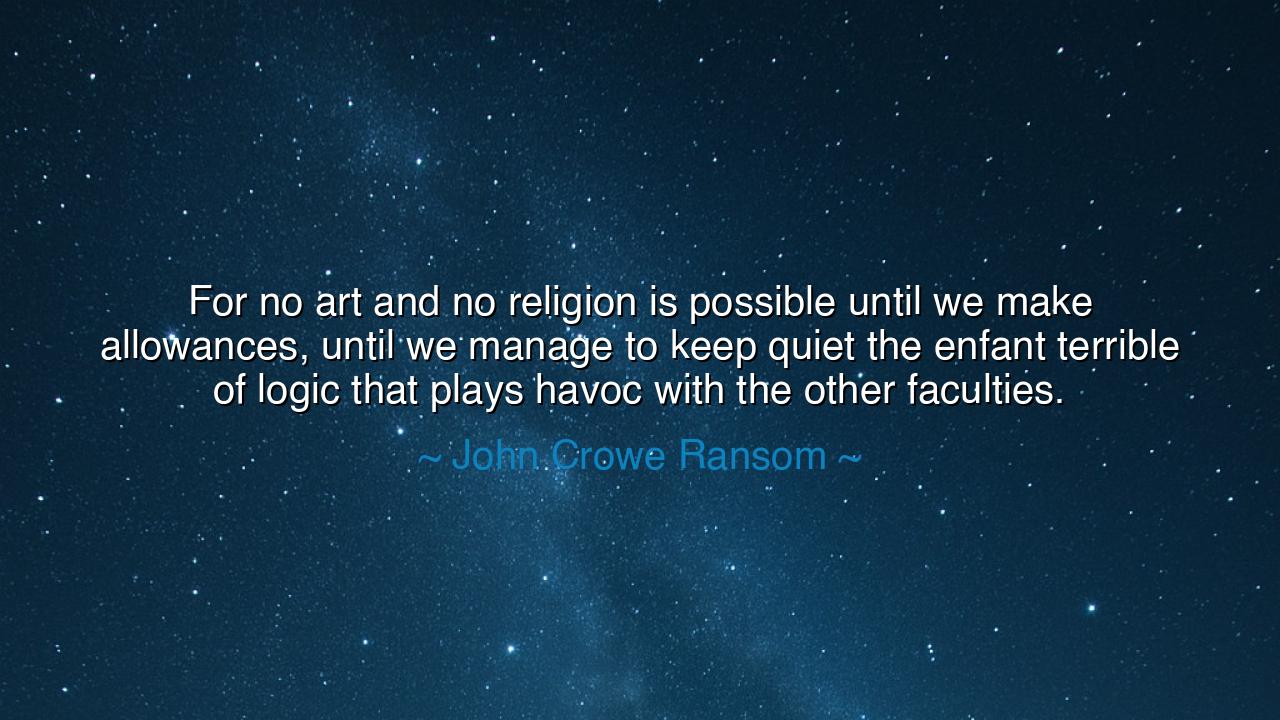
For no art and no religion is possible until we make allowances
For no art and no religion is possible until we make allowances, until we manage to keep quiet the enfant terrible of logic that plays havoc with the other faculties.






John Crowe Ransom, poet and thinker of the modern age, declared with piercing clarity: “For no art and no religion is possible until we make allowances, until we manage to keep quiet the enfant terrible of logic that plays havoc with the other faculties.” In this utterance lies a profound insight: that while logic is a noble servant, it is also a dangerous master. If given unchecked reign, it strips life of mystery, beauty, and awe, leaving only cold calculation where once there was wonder. Ransom warns us that to create art, or to experience religion, we must learn to quiet the restless voice of rationality, not to destroy it, but to prevent it from devouring the deeper faculties of imagination, faith, and love.
The ancients knew this well. Plato himself, though master of reason, taught that poetry touches truths that logic alone cannot capture. The mystics of every tradition have spoken of the limits of reason before the infinite. For religion requires a leap beyond what can be measured, and art demands surrender to intuition, to feeling, to inspiration that logic cannot dissect without killing. Just as a butterfly cannot be pinned to the table without losing its flight, so too the soul of faith and beauty dies when reduced to mere analysis.
Consider the story of Beethoven. Deaf and suffering, he composed symphonies that shook the heavens, music that reason could never have constructed step by step. The mathematician may chart the frequencies of sound, the physicist may measure vibrations, but the art that arose from his heart was beyond the reach of calculation. Had Beethoven listened only to the “enfant terrible of logic,” he might have surrendered to despair, declaring that music was impossible without hearing. Yet by silencing logic’s havoc and yielding to imagination and spirit, he gave the world a gift eternal.
So too in religion. If faith is forced into the cage of proof and syllogism, it withers. The mystic who kneels in prayer, the saint who sees God in the face of the poor, the seeker who finds meaning in silence—all live beyond the grasp of pure reason. Logic asks: “Can you prove it?” Faith answers: “Can you live without it?” Ransom reminds us that for religion to breathe, we must allow mystery, reverence, and humility to rise above the demand for certainty.
Yet do not misunderstand: Ransom does not despise logic. He calls it an enfant terrible, a child brilliant but unruly, mischievous yet necessary. It must be guided, restrained, balanced by the other powers of the soul. Logic is a lantern, but life requires also the sun; it illuminates details but cannot encompass the vast horizon. Only when we learn to place logic in harmony with imagination, conscience, and wonder can we live fully, can we create great art, can we experience the divine.
History bears witness. The Enlightenment exalted reason, yet in its shadow arose Romanticism, poets and painters who cried out that life is not numbers alone. William Blake saw visions where others saw only factories and smoke. Dostoevsky probed the depths of faith where reason faltered. These were voices reclaiming the soul from the havoc of unchecked rationality, restoring balance between the faculties of man. Their cry was the same as Ransom’s: silence the enfant terrible, and let the deeper music of the soul be heard.
The lesson is clear: cultivate logic, but do not let it reign unchallenged. Give space in your life for mystery, for imagination, for reverence. Do not demand that every truth be proven, nor every beauty dissected. Allow yourself to wonder at the stars without needing to measure them, to weep at a poem without analyzing it, to pray without demanding evidence. For in these moments, you will discover what logic cannot give: the fullness of life.
So, O children of tomorrow, remember this: no art and no religion is possible without allowance, without humility before mystery. Train your reason, but also nourish your imagination, your compassion, your awe. Keep logic as a servant, not a master, lest it rob you of wonder. For man does not live by proof alone, but by beauty, by faith, by the silent music of the soul. In this harmony lies the fullness of our humanity.






AAdministratorAdministrator
Welcome, honored guests. Please leave a comment, we will respond soon